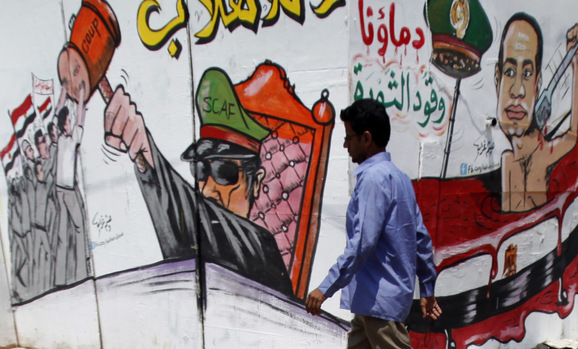 The Muslim Brotherhood had been operating underground for decades until winning elections in July 2012 and seeing member Mohammed Morsi picked as president. A year later, millions of citizens took to the streets on June 30 demanding a new president. Gen. Abdel Fattah al-Sisi, head of the military, listened to the masses and asked Morsi to conduct a referendum — but he refused. Placed under house arrest, Morsi warned in his last speech that if he was removed, Egypt would enter a dark hole of violence.
The Muslim Brotherhood had been operating underground for decades until winning elections in July 2012 and seeing member Mohammed Morsi picked as president. A year later, millions of citizens took to the streets on June 30 demanding a new president. Gen. Abdel Fattah al-Sisi, head of the military, listened to the masses and asked Morsi to conduct a referendum — but he refused. Placed under house arrest, Morsi warned in his last speech that if he was removed, Egypt would enter a dark hole of violence.
The inciting tone in his speech was a direct message to his supporters, who have responded with nationwide violence and killings. Armed with all kinds of weapons, his supporters in Cairo, Alexandria, Sinai and other places clashed with his opponents and army and police. The important question on the political scene was how to bring the Muslim Brotherhood into the interim cabinet and accept this group.
The answer was a big NO, as the Muslim Brotherhood refused to enter the political process until Morsi is released.
Monday's clashes between supporters and opponents of the ousted Morsi left 12 dead and 86 injured.
A new group called Muslim Brotherhood Against Violence hopes to maintain the group's "peaceful" history as a decent religious group away from politics.
"We have 1,850 signatures now to petition the current leaders, oust them and bring in young leaders. We will present the signatures to court and demand we get control of all the MB offices across the nation and be able to enter the democratic process," explained Ahmed Yehia, the official spokesman of the ambitious group.
If the group does not get support from courts, they plan to travel to Turkey and meet with the leaders of the International MB Association and demand that current leader Mohammed Badie be ousted and replaced by an elected younger leader, according to Yehia.
On Tuesday, 50 members of the Muslim Brotherhood Against Violence went to collect signatures from inside Rabaa Adweya mosque in Cairo's Nasr City, where tens of thousands of Morsi supporters have been protesting for more than three weeks. After collecting 600 signatures, four of the volunteers were beaten by men at the sit-in who held them hostages and flogged them for their actions. Yehia said they will submit a memo to the prosecutor immediately against the flogging and torture of their members held hostage.
Violence in Egypt has increased since Morsi's ouster as his supporters attacked churches, with daily killings of military and police officers in Sinai and other places.
This week in Mansoura, three women were killed in a pro-Morsi march. The stage at Rabaa Adewaya blasted speeches by Brotherhood leaders like Safwat Hegazi, Mohamed El-Beltagy and Esam el-Erian, who are hiding among the thousands after the general prosecutor issued an arrest warrant for them for "inciting violence"
At least 100 people have been killed since the ouster of Morsi on July 3, according to the Ministry of Health.
Mass shooting of Islamist protesters by Egyptian military forces at a sit-in outside the Republican Guard building several weeks back highlighted new outrage in standoff against the military junta that aided in Morsi's removal.
A vendetta has been deepened by Morsi's Islamists supporters and their opponents. Every day that passes lessens their chances that the Muslim Brotherhood might be accepted back into the political process they see as totally illegitimate.
Morsi and his aides remain prisoners, held incommunicado, and have not been charged with a crime.



